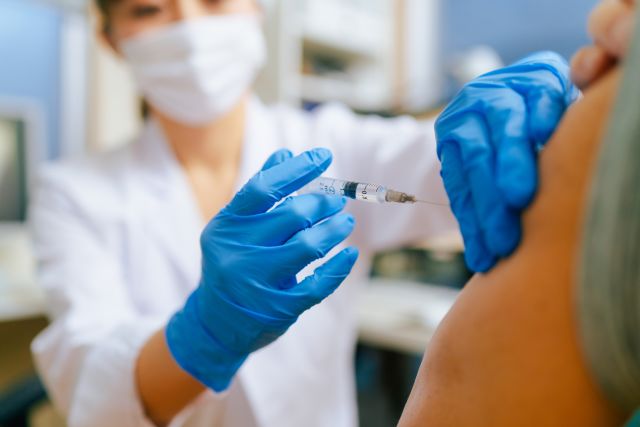Updated on January 10, 2022.
Omicron, the new COVID variant spreading like wildfire around the world, is now the dominant strain in the United States, accounting for more than 95 percent of all new cases. But more data suggests that the Pfizer and Moderna boosters offer protection against it.
“Current data demonstrate that receiving a booster dose is critical to provide protection against COVID-19 and the Omicron variant,” said Centers for Disease Control and Prevention (CDC) director Rochelle Walensky, MD, PhD, in a January 5 White House press briefing.
Moderna released early trial data on December 20, assessing how its mRNA booster held up against Omicron. The booster, which is half of the dose that is given for the first two shots, is given at least six months after the second dose. The trial compared the effectiveness of a half dose against the new variant with a full third dose. Researchers found the half dose resulted in a 37-fold increase in neutralizing antibody levels. The full dose was associated with a more dramatic immune response, or a roughly 83-fold increase in antibody levels. Both boosters were shown to be safe and well-tolerated but known side effects were more common following the higher-dose booster.
Roughly two weeks earlier, Pfizer and BioNTech also announced early results of a laboratory study released on December 8, which shows that while the initial two doses of its mRNA vaccine was "significantly less effective” at protecting against Omicron, a booster shot was able to effectively neutralize it in lab tests.
Compared to two doses, the data showed the Pfizer booster increased neutralizing antibody levels by 25-fold against Omicron. The companies said the antibodies triggered by their booster neutralized Omicron to levels comparable with two doses of the vaccine against the original coronavirus strain, which are associated with a high level of protection.
As Omicron quickly outcompeted the highly contagious Delta strain to achieve dominance in the U.S. and other parts of the world, White House chief medical advisor, Anthony Fauci, MD, eased concerns about the need for an Omicron-specific vaccine advising that existing boosters do not need to be adjusted.
“Our booster vaccine regimens work against omicron,” Dr. Fauci said during a December 15 White House briefing. “At this point, there is no need for a variant-specific booster.”
Fauci’s announcement followed a grim milestone in the United States. Just a day earlier, the U.S. death toll from COVID-19 reached 800,000. President Biden offered words of empathy and condolences to all those who’ve lost friends and loved ones, but also issued a reminder that vaccinations remain the most effective tools available to help prevent more deaths.
“As we head into the winter and confront a new variant, we must resolve to keep fighting this virus together,” Biden said in a December 14 statement. “This means getting vaccinated and getting your booster shot, and taking other prevention measures, such as masking.”
What the latest Omicron research shows
South Africa’s largest private health insurance administrator, Discovery Health, released preliminary findings from a real-world analysis of the Omicron outbreak in the country. The yet-to-be-published analysis is based on 211,000 COVID-19 test results.
The study shows that amid the Omicron wave, protection from infection dropped from 80 percent to 33 percent among those who got two-doses of the Pfizer-BioNTech vaccine. The risk for reinfection with Omicron is also higher compared to other known variants.
Recent findings from the U.K. Health Security Agency, however, show that boosters can increase protection against Omicron to 75 percent.
“And so the message remains clear. If you are unvaccinated get vaccinated, and particularly in the arena of Omicron if you are fully vaccinated, get your booster shot,” Fauci said.
More Americans are getting vaccinated—and boosted
Unvaccinated people are six times more likely to test positive for COVID-19, nine times more likely to be hospitalized and 14 times more likely to die from the disease than those who are full vaccinated, the U.S. Centers for Disease Control and Prevention (CDC) reports.
Since South African health officials alerted the world to the emergence of the heavily mutated Omicron variant on November 24, more Americans have rolled up their sleeves.
In the United States, there are three COVID vaccines available—the two-dose Pfizer or Moderna mNRA vaccines and the single-dose J&J vaccine. Adults ages 18 and older can choose to receive any one of them. All adults can get a booster dose of any one of the three vaccines five months after their second dose of the Pfizer or Moderna vaccine or two months after their J&J shot.
Children and teens ages 5 to 17 are eligible to receive the Pfizer COVID vaccine. Those aged 12 to 17 are also eligible for the Pfizer booster. Immunocompromised children ages 5 to 11-years old can also get a third dose of the Pfizer vaccine as part of their primary series.
As of January 6, 62.4 percent of the U.S. population is fully vaccinated, 74 percent have gotten at least one dose and 35.3 percent of fully vaccinated people are boosted, according to the CDC. The Delta variant accounted for nearly all new COVID cases since the summer, but research suggests Omicron is more than twice as infectious. South Africa first raised alarms on November 24, and within one month, the new variant outcompeted Delta. It now accounts for an estimated 95.4 percent of new cases in the United States.






